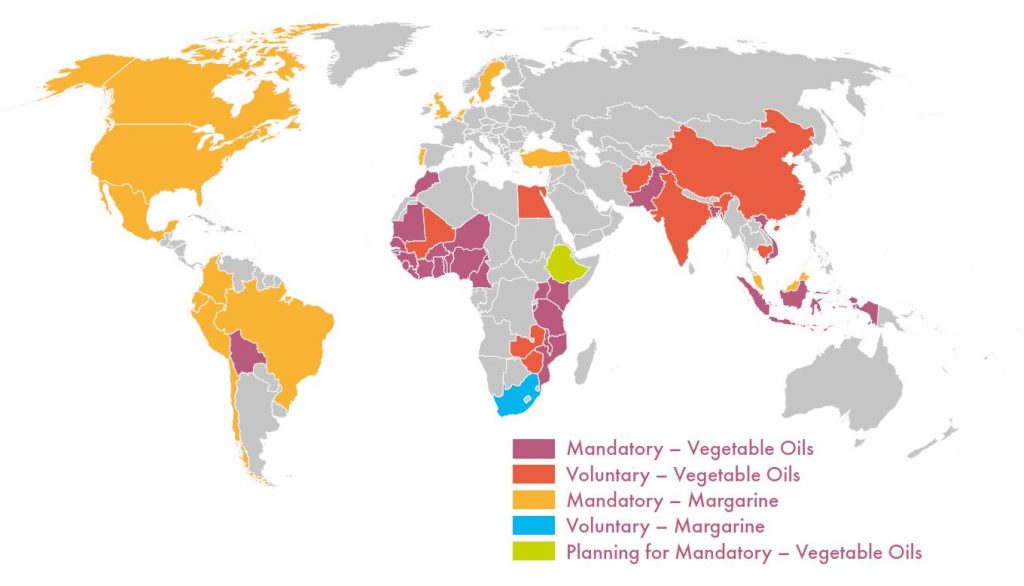
AUGUST 2020
Why Fortify Edible Oil?
Vitamin A deficiency (VAD) affects 250 million preschool-age children, and 20 million pregnant women worldwide. It is the leading cause of preventable blindness in children, resulting in at least 250,000 cases of blindness every year. VAD also leads to night blindness in pregnant women and increases the risk of maternal mortality.
One of the most cost-effective public health interventions to reduce the risk of vitamin A deficiency is Large-Scale Food Fortification (LSFF). LSFF is the addition of vitamins and minerals (e.g. vitamin A, vitamin D, iron, zinc, and folic acid) to staple foods like wheat or maize flour, edible oils and fats, salt, sugar, and rice. Edible oils and fats are commonly fortified with the fat-soluble vitamins A and D. LSFF works best where a food is 1) widely consumed by populations regardless of socioeconomic status; and 2) centrally manufactured or processed. Edible oils and fats are such foods, since they are consumed in almost every household worldwide in relatively small but consistent quantities of about 12-33 grams/person/ day. Furthermore, in most countries, edible oils and fats are processed centrally by medium and large-scale producers, what makes it easier to implement and monitor fortification process.
Fortification of margarine with vitamin A was first mandated over 100 years ago in Denmark, what practically eliminated cases of xerophthalmia, eye disease associated with Vitamin A deficiency. Vitamin D fortification had similar effect on the incidence of rickets, associated with vitamin D deficiency. United States and Great Britain quickly followed Denmark and mandated fortification of margarine. In middle of 20th century India and Pakistan also mandated fortification of edible oils with A and D in some provincial areas. Today, 49 countries mandate the fortification of vegetable oils or fats.

49 countries mandate fortification of vegetable oils or fats. (Source: Hoogendoorn et al. 2FASEC. 2016)
Fortification costs range from US$ 2 to 20 per metric tonne of oil for large-scale producers, which makes up around of 0.3-3% of the purchase price or US$ 0.012-0.12 per person annually. The cost is mainly attributable to the cost of vitamin premix being added to edible oil or fat. Common commercial premix contains 1 -1.7 million International Units per gram (IU/g) of vitamin A as retinyl palmitate; or 1 – 1.1 million IU/g and 100,000 – 110,000 IU/g of vitamin D as cholecalciferol (D3) in an oily blend. The process of mixing in additives during edible oil production is well known to oil producers. Antioxidants, such as BHA, BHT, and vitamins C and E are routinely added to oil to support shelf life and prevent oxidation. They can also protect vitamin A from degradation.
The benefit to cost ratio to fortify vegetable oil has been estimated at US$ 16-280 per DALY (disability adjusted life year) or a ratio of as low as 50:1, for a cost of less than US $ 2 per metric tonne. Studies across several LMIC countries have shown that fortified can contribute 20-50% of the recommended dietary intake for vitamin A to the target population, leading to at least 15% decrease in the prevalence of VAD in children and women who are most at risk.
iCheck Chroma (3) to Measure Vitamin A in Edible Oils
To ensure that vital micronutrients, like vitamin A, are added at the right concentrations in fortified edible oils, rapid portable analysis methods are necessary. You can use iCheck Chroma (3) to measure the vitamin A content in your fortified edible oil samples. Here at BioAnalyt, we have compared results with iCheck to those of standards methods to ensure the reliability and accuracy of measurements. There is a good correlation between iCheck and the HPLC methods used in conventional laboratory settings. This shows that iCheck can perform similarly, while still providing results easier, faster, and at 10% the cost of conventional lab methods.
Download our fortified edible oil application paper here to learn more. The BioAnalyt team remains on stand-by to answer your technical questions, provide product support, or assist you with ordering iChecks and test kits. Contact us today!

